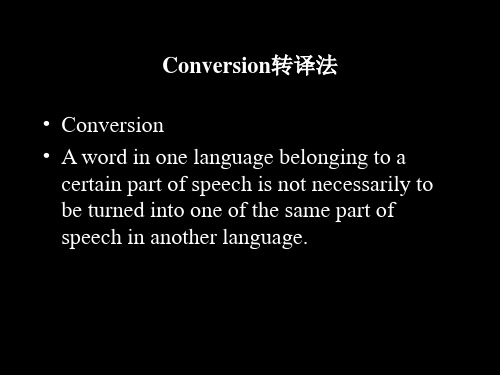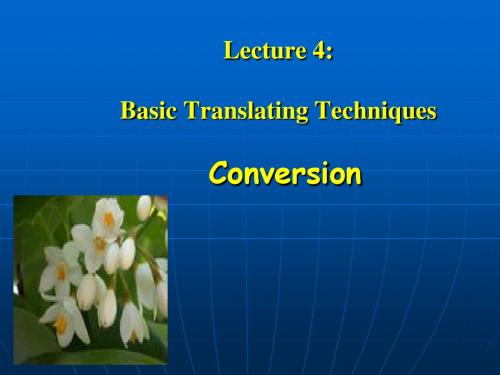conversion 例句及翻译
- 格式:doc
- 大小:39.50 KB
- 文档页数:4

Conversion(转换法)Conversion of Word Classes(转换词类)Translate the following and compare the parts of speech employed in English and Chinese:1. 他请求领导分配他到基层去工作。
(5 verbs)2. 你写信叫他派人想办法去了解全部情况。
(6 verbs)3. 我去叫他派一个会计到这儿来帮助你算账吧。
(7 verbs)Conversion from English Nouns and Adjectives into Chinese Verbs and Adverbs(英语名词、形容词转换为汉语动词、副词)Examples:1. All peace-loving people demand the complete prohibition and thorough destruction of nuclearweapons.一切爱好和平的人民都要求全面禁止核武器,彻底销毁核武器。
(cf. 核武器的全面的禁止和彻底的销毁)2. Ford’s first pledge was, “Mr. President, you have my support and my loyalty.”福特一开始就保证说,“总统先生,我支持你,并效忠于你。
”(cf. 你有我的支持和我的效忠)3. Rockets have found application for the exploration of the universe.火箭已经用来探索宇宙。
(cf. 已经发现宇宙探索的应用)4.For 20 years we were passive witnesses to the deterioration of prices of our raw materials and anexcessive increase of the prices of manufactured goods.过去二十年,我们坐视我们的原料价格下跌,而工业品价格却暴涨。




UNIT 3 CONVERSIONConversion, one of the commonly adopted translation techniques, means the change of parts of speech in translation.Owing to the syntactical differences between English and Chinese, it is usually impossible for a translator to keep to the original part of speech in the process of translation.For example:This watch neve r varies more than a second in a month.这块表一个月的误差从不超过一秒钟。
The English verb “vary” can hardly be rendered into Chinese by the same part of speech without spoiling the original meaning.In fact, a word belonging to a certain part of speech in one language sometimes has to be converted into a different part of speech, so as to bring forth a readable and coherent sentence.I. Conversion in English-Chinese Translation1. Converting into VerbsOne of the most remarkable differences between English and Chinese syntax is the use of the verb. It is taken for granted that an English sentence contains no more than one predicate verb, while in Chinese it is not unusual to have clusters of verbs in a simple sentence.Families upstairs have to carry pails to the hydrant downstairs for water.住在楼上的人家得提着水桶去楼下的水龙头打水。

翻译知识与策略:conversionconversion from English nouns and adjectives into Chinese verbs and adverbs:1). All peace-loving people demand the complete prohibition and thorough destruction of nuclear weaspons. 一切爱好和平的人民都要求全面禁止核武器,彻底销毁核武器。
2). From the depths of its being, they are endeavoring to bring about a radical transformation of human life. 他们力图从根本上彻底改变人类生活。
3). He was a clever man; a pleasant companion, a careless student; with a great propensity for running into debt, and a partiality for the tavern. (V anity Fair) 他是个聪明人,谈吐非常风趣,可是学习上不肯用功,老是东挪西借,又喜欢上酒店喝酒。
4). Television is the transmission and reception of images of moving objects by radio waves. 用无线电波传送和接收活动物体图象的技术称为电视。
5). No violation of this principle can be tolerated. 违犯这一原则的行为是不允许的。
1.1.conversion from English adjectives into Chinese verbs:1). She is familiar with English grammar. 她熟悉英语语法。
高中英语知识点转化法高中英语知识点转化法一. 转化法(conversion)在英语中,一个单词由一种词性转化为另一种或几种词性而词形不变的方法叫做转化法。
1. 动词转化为名词Let me have a try.让我试试。
They are only allowed to sell soft drinks at school.在学校里只准许他们出售不含酒精的饮料。
2. 名词转化为动词He shouldered his way through the crowd.他用肩膀推开人群前进。
The smell from the kitchen made his mouth water.从厨房传来的气味使他流口水。
3. 形容词转化为动词We will try our best to better our living conditions.我们要尽力改善我们的生活状况。
They tried to perfect the working conditions.他们努力改善工作条件。
4. 形容词转化为名词He didn’t know the difference between right and wrong.他不辨是非。
The old in our village are living a happy life.我们村的老年人过着幸福的生活。
5. 形容词转化为副词How long have you lived there?你在那儿住多久了?6. 个别词在一定场合中可转化为名词Warm clothes are a must in the mountains.穿暖和的衣服到山区去是必须的。
Life is full of ups and downs.人生有得意时也有失意时。
His argument contains too many ifs and buts.他的辩论中含有太多的“如果〞和“但是〞。
高中英语常用动词构带to doing sth的知识点1.动词+介词to+动名词(1) admit to doing sth. 成认做了某事(2) apply to doing sth. 适用于做某事(3) object to doing sth. 反对做某事(4) see to doing sth. 负责做某事(5) stick to doing sth. 坚持做某事(6) take to doing sth. 喜欢上做某事,逐渐习惯做某事2.动词+宾语+介词to+动名词(1) apply oneself to doing sth. 专心致力于做某事(2) devote sth. to doing sth. 把……献给做某事(3) devote oneself to doing sth. 献身于做某事(4) limit sth. to doing sth. 把……限制在做某事的范围内(5) reduce sb. to doing sth. 使某人沦为做某事(6) give one’s life to doing sth. 献身于做某事(7) give one’s mind to doing sth. 专心做某事(8) have a dislike to doing sth. 厌恶做某事(9) have an eye to doing sth. 注意做某事(10) have an objection to doing sth. 反对(反感)做某事(11) pay attention to doing sth. 注意做某事(12) set one’s mind to doing sth. 决心做某事4.be+形容词/done+介词to+动名词(1) be equal to doing sth. 等于做某事,能胜任做某事(2) be used to doing sth. 习惯于做某事(3) be opposed to doing sth. 反对做某事(4) be reduced to doing sth. 使某人沦为做某事(5) be devoted to doing sth. 把时间(钱,精力等)献给做某事(6) be limited to doing sth. 把……限制在做某事的范围内 5.其他结构+介词to+动名词(1) get down to doing sth. 开始做某事,认真处理某事(2) look forward to doing sth. 盼望做某事(3) What do you say to doing sth? 你认为做某事如何。
一. 名转动
1. 我们不能容忍这样的侮辱。
We can’t stomach such an insult.
2. 谁雇佣你来干涉我的私事?Who has hired you to nose into my own business?
3. 你做了错事,现在你得承担后果。
You have done wrong, and now will have to face the music.
4. 机会到来时,他犹豫不决,过后又懊悔。
He Hamleted at the chance and then he regretted for it.
5. 小船在河上碰礁遇难。
The canoe Titanicked on a rock in the river. (Titanic是美国号称“永不沉没的巨轮”,1912年4月15日在大西洋触冰山沉没。
)
6. 他狼吞虎咽地吃了午饭。
He wolfed down his lunch.
⏹7. 她没有因胆怯而退缩。
She didn’t chicken out.
⏹8. 灾难紧追着海林不放。
Misfortune dogged Hailin’s steps.
⏹9. 他们国家的物价象氢气球一样地急剧上升了。
The prices ballooned in their
country.
⏹10. 焦虑使他快步如飞。
Anxiety winged his feet.
⏹11. 彩虹横跨天空。
The rainbow bridged the sky.
⏹12. 他有礼貌地把来访者慢慢打发到门口。
He politely edged the visitors to the door.
⏹13. 他读书度过此周末。
He booked away the week-end.
⏹14. 他把计划搞到手,就乘直升飞机去首都。
He got the plans and helicoptered to the
capital.
⏹二. 形转动
⏹15. 他使自己的声音坚定起来。
He firmed his voice.(形转动)
⏹16. 我们用窗帘美化房间。
We have curtains to pretty up the room.(形转动)
⏹三. 副转动
⏹17. 知识分子又受到了重视。
The intellectuals are muched again.(副转动)
⏹18. 海军上将当场提升了这个年轻水手。
The admiral upped the young seaman on the
spot.(副
⏹转动)
⏹四. 感叹转动
⏹19. 我叔叔对整个计划嗤之以鼻。
My uncle pooh-poohed the whole plan.(感叹转动)⏹20. 学生们对这个主意表示轻蔑。
The students tut-tut the idea.(感叹转动)
⏹21. 工程师们对这台新机器“哎哟”、“啊呀”地大加赞赏。
The engineers ahed and ouched at the
⏹new machine.(感叹转动)
⏹五. 复合词转动
⏹22. 她企图用甜言蜜语诱使他们走出来。
She tried to sweet-talk them to come out.(形+名转动)
⏹23. 昨天我们举行秘密会议。
We close-doored the meeting yesterday.(形+名转动)⏹24. 他们抄近路到西湖。
They short-cut their way to the West Lake.(形+名转动)
⏹25. 这点误会妨碍了他们的友谊。
This misunderstanding short-circuited their friendship.(形+名
⏹转动)
⏹26. 我想明天溜达看看商店橱窗。
I’d like to window-shop tomorrow. (名+名转动)⏹27. 马上干起来!别再想入非非了。
Be up and doing! Don’t day-dream any longer. (名+名转动)
⏹六. 动转名
⏹28. 她很固执,很难说服。
There is no come and go with her. (动转名)
⏹29. 你最好再想一想。
You had better have another think. (动转名)
⏹30. 这件外衣买得好。
The coat is a good buy. (动转名)
⏹31. 你是这里最优秀的人。
You are the pick of the basket here. (动转名)
⏹32. 如要磋商成功,必须双方让步。
There must be give and take if the negotiations are to succeed. (动转名)
⏹33. 对你来说,这是一件必须做的事。
For you this is a must.(动转名)
⏹34. 对大多数访问北京的外宾来说,万里长城是必游之地。
The Great Wall is a must for most foreign visitors to Beijing.
⏹35. 这是一部重新摄制的影片。
This film is a remake. (动转名)
⏹七. 副转名
⏹36. 他浮沉一生,坎坷不平。
There are ups and downs in his life.(副转名)
⏹37. 他知道这件事情里里外外。
(或:他了解这事的内情底细。
)He knew the ins and outs of the matter. (副转名)
⏹38. 我们必须对每件事情问个为什么。
We must go into the hows and whys of everything. (副转名)
⏹八. 形转名
⏹39. 我是他的熟人之一。
I’m one of his familiars.(形转名)
⏹40. 她是个古怪的女人。
She is a queer. (形转名)
⏹九. 其它
⏹41. 你要一杯放糖的茶还是不放糖的茶?Would you like a with or a without? (介转名)
⏹42. 在这个城市的人看来,穿长裙过时,穿短裙时髦。
For the people of the city, long-skirts are out, miniskirts are in.(介转副)
⏹43. 随大流者总比袖手旁观者好。
Better to be an also-ran than a never-was. (“副+动”复合词转名)
⏹44. 玛丽的新生儿是男的吗?Is Mary’s new baby a he? (代转名)
⏹45. 他的父亲是个具有男性魄力的人。
His father is a he man. (代转形)
⏹46. 王教授是当时的系主任。
Professor Wang was the then dean. (副转形)
⏹47. 你是成功者还是壮志未酬者?Are you a has-been or a might-have-been? (动词词组转名)
⏹48. 他乘出租汽车去机场。
He taxied to the airpot. (名转动)
⏹49. 我看见几个顽童在拼命厮打。
I saw some naughty boys fighting tooth and nail. (名转副)
⏹50. 我不想听你的任何借口,马上把药吞服下去。
I don’t want any ifs and buts——swallow your medicine at once. (连接词转名词)。